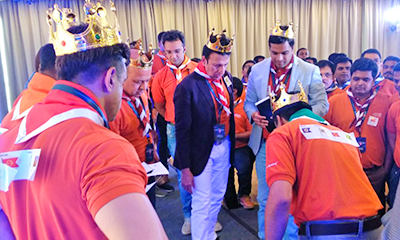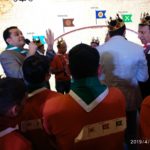NuTurns Facilitated Kingdoms of India for Angel Broking – A One Day Experiential Simulation on Enhancing Collaboration
Angel Broking had its Annual Strategy Meet, 2019 in Parwanoo, Himachal Pradesh. It was a 3 day mega event titled Fuel The Future. The event started with the keynote speaker, Mr. Devdutt Pattanaik. In his 60 minute talk he beautifully connected the interpretations of ancient Indian scriptures with challenges and solutions for today’s businesses.
In his unique oratory style, he seamlessly and profoundly touched the critical business areas like strategy (garuda drishti), tactics (sarpa drishti), customer centricity, I focus (Lord Indra) Vs. customer focus (Lord Vishnu), competition vs. collaboration, identifying and addressing customer’s unmet problems and unsaid needs (bookh/hunger), and offering customized services to customers.
One of the major highlights of this 3 day mega event was a simulation called Kingdoms of India, which was facilitated by NuTurns. NuTurns is one of the official L&D partners of Angel Broking. NuTurns offered Kingdoms of India as a solution to give profundity to 2 of the 4 business values of Angel Broking – Innovation and Collaboration.
The CEO of Angel Broking, Mr. Vinay Agrawal and the chief of HR and Learning, Mr. Subhash Menon, were determined to give a clear message to their people on how the values of innovation and collaboration (instead of working in islands) could drive the entire organization in pursuing its goals.
The simulation on collaboration – Kingdoms of India was played in 2 sessions. In the first part the team – around 90 of them from Chairman, Mr. Dinesh Thakkar to all the chieftains – strategized to build a warship. They were divided equally in 10 teams representing the 10 ancient kingdoms of India.
Each kingdom raced to build a warship to compete with fellow kingdoms to proliferate its arms and ammunition. It was a race for nuclear weapons. The winner among kingdoms would be in a superior position to negotiate and dictate their terms when they trade or go for a war.
The serious race was filled with (envious) laughter, competition and war cries on the battlefield situated 5,000 ft. above sea-level, overlooking the magical and mystical Shivalik ranges. The battle yell broke the tranquility of one the most romantic resorts of India. The overall ambience felt like Nataraja’s (Lord Shiva) Rudra Tandava in the misty night of Shivalik ranges
After displaying the might and prowess of their warships the 10 ancient kingdoms of India met next morning for the 2nd session of the simulation. The winner kingdoms were transferred the forbidden nuclear technology. This helped them to flex the muscle of power, politics and supremacy.
With the break of a dawn the next war about to break. The unequal distribution of resources and highly inflammable egos bugled the next war. The kingdoms with lesser resources – food, clothes and gold, had more military power. The kingdoms with surplus resources had more foes than friends.
Every kingdom had to wage a war if they were unable to fulfill their yearly commitments, which they had promised to their people. If they didn’t there was a danger that people would take up the arms and revolt against them. So in either of the cases war was inevitable.
In this 5 year (each year representing 15 minutes, excluding the time for war) gameplay each kingdom had to fulfill its yearly commitments and achieve the grand vision of United India. In the 1st year kings were able to fulfill their promises. But in the 2nd year mighty Malwas broke war against Vakatakas because they were short of resources. Both the kingdoms confronted each other with grenades and bombs. The result was mass destruction
There was competition and jealousy in the air. No one was ready to lay their arms. But then one man had a light bulb moment! He was from the other kingdom. He mediated to end the war. He came up with a brilliant solution. He was the CEO of Angel Broking – Vinay Agrawal. The kings realized their follies. Through this creative and win-win idea they were able to meet their commitments and achieve the grand vision of United India. By default we love competition and hate collaboration. Kingdoms of India is a testimony to it

The Kings had arms and armours, in which they took pride. They had built it themselves. They were rewarded for it. But the problem was they couldn’t see beyond that.
In the debrief of this one day simulation – Kingdoms of India the Angel Broking team shared 10 brilliant, insightful and profound lessons.
- Don’t use ammunition (hard words & body language) to hurt others
- Share information and resources to support other departments in delivering their commitments
- Handle crisis not by blaming or passing the buck, but by discussions and communications
- Live the culture and deliver individual, team, and organizational goals
- Break down silos and create an environment of trust
- Negotiate to generate mutually beneficial results and productive partnerships
- Align goals and efforts at every organizational level through focus on the “big picture”
- Practice transparency of resources
- Greed, personal ambition, supremacy, group-ism, blame-game and distrust are obstacles for collaboration
- Not giving timely feedback and preferring to be passive and silent is a big threat to collaboration
By default we are all Indras (the king of Gods). We all are gifted with abundance. But the ignorance of this knowledge, greed, fear and jealousy gives birth to the feeling of scarcity. The values and culture of sharing, caring and collaborating rewards any organization in the long run.


